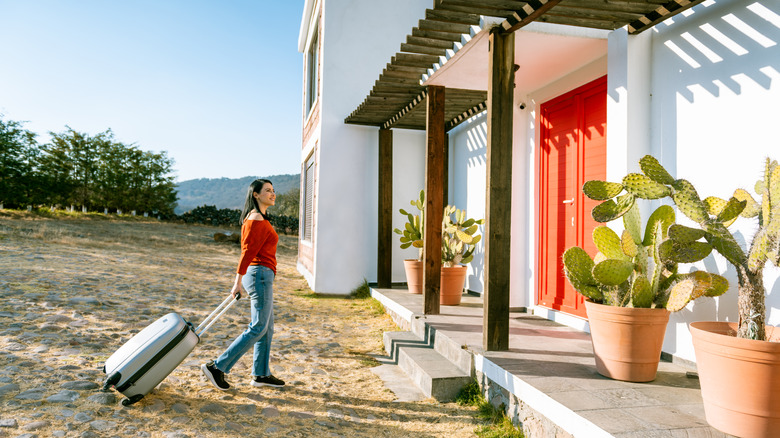Don't Ignore These Sneaky Dangers Of Using Home Exchanges For A Cheaper Vacation
The concept of home exchanges, also known as home swapping, has been around since at least the 1950s, but these days, it's more popular than ever. It works just as it sounds: Find a home exchange partner and book simultaneous trips, and you will stay in each other's properties concurrently. Less commonly, you can also dwell in someone's vacation (second) home without them coming to stay in yours, or you can lodge in their home while they're present.
If you're wondering how to do a home-swapping getaway like "The Holiday," it's straightforward. The average property exchange begins on dedicated websites such as HomeExchange and Kindred, though Facebook groups and other platforms can also help people connect with potential swappers. One of the biggest benefits of home exchanges is the relatively low cost. Instead of springing for a hotel room or short-term accommodation, you can stay in a full property for free (or, in some cases, the cost of a home-swapping membership).
However, there are risks involved when exchanging your home for a stranger's. One of the most critical issues with home swapping is the lack of guarantees or protections offered to travelers. The shower might run cold, or the Wi-Fi may not work, yet it's unlikely you'd receive any compensation for your trouble — even if you wind up having to pay for a hotel room. Your exchange partner could also cancel at the last minute, leaving you with flight cancellation fees and other surprise costs.
Home swaps can get messy — literally
The ideal home exchanger is someone with a stylish, well-designed accommodation in a desirable location. If that sounds like you, you may be eager to share your abode with others who will appreciate it just as much as you do. Unfortunately, not everyone who participates in home swaps has the same standards for care and cleanliness, and you could return to your property to find a surprise mess. AlteCocker, a traveler who's experienced in home exchanges, shared on her blog that cleanliness is one of the most common concerns when it comes to swaps, and photos posted online don't usually depict how tidy or hygienic a swapper really is.
Additionally, visitors might not be as careful with your items as you would be. ShareTraveler revealed one person's story of a home exchange gone bad. Dinnerware pieces had been broken, dirty dishes were left in the sink, and the bathtub was filled with trash. Another account described on the website involved a house filled with mold and dirt — not the ideal condition for a relaxing vacation. Sure, a hotel room can be unclean and have pests, too, but when it's someone else's home, it's harder to report the issue or request a visit from housekeepers. And it can be especially risky when a dirty or careless person is staying in your home.
How to protect yourself during home exchanges
The good news is that serious dangers associated with home exchanges are rare, and risks such as theft or property damage are nearly unheard of. Still, if things do go south, home-swapping organizations aren't usually responsible. The only repercussion for your swapping partner may be that their membership is revoked.
With this in mind, it's crucial to protect yourself before you start booking your flight online or by phone. Some home exchange platforms don't screen members, so get to know a potential swapper by asking for references and meeting through a video call. If your budget allows, select a platform that requires a fee, as the cost may eliminate some bad actors and people who aren't truly committed to an exchange. Also, create a document with house rules and confirm your guest's agreement with the guidelines before finalizing your house swap.
Finally, make sure your home is ready for visitors. Many home insurance companies won't offer protection during swaps, so be prepared to take out additional property coverage and liability insurance in case an emergency occurs. Then, check your home for potential safety hazards and make sure that smoke and carbon monoxide alarms are fully functioning before handing over your keys.


